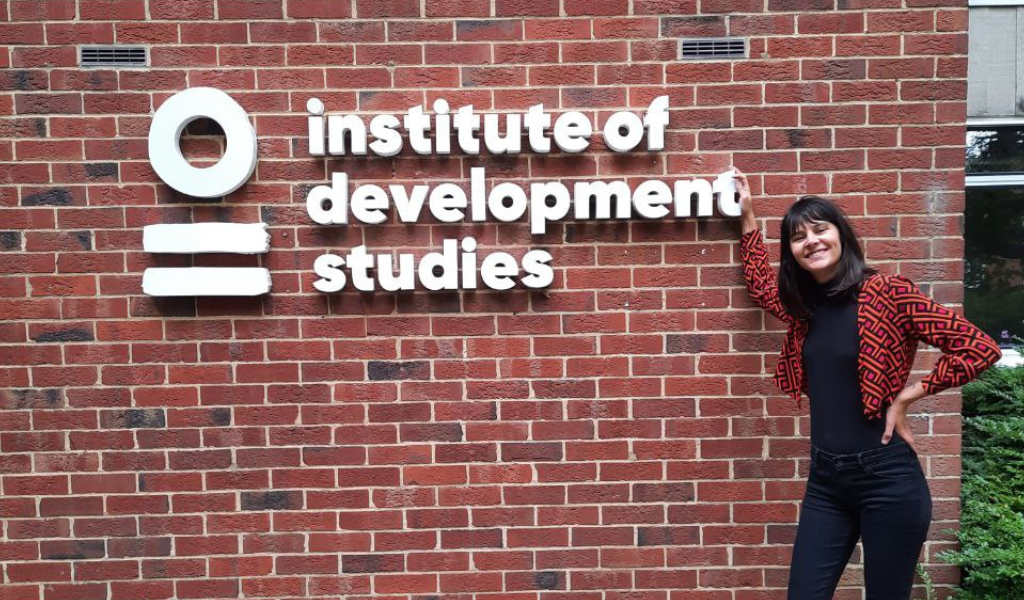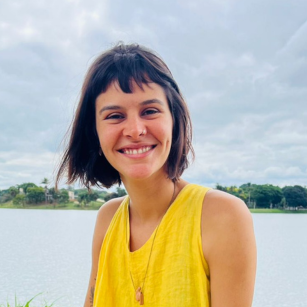Bruna Viana de Freitas studied MA Power, Participation & Social Change (MAP) at IDS in 2021-22 and went on to set up Cúrcuma, a consultancy working with participatory approaches for justice and inclusion, mainly focusing on socioenvironmental and human rights fields. In this blog post, Bruna answers our questions about her experience of studying her master’s at IDS.
Interviewer: Why did you decide to study MA Power, Participation & Social Change?
Bruna Viana: In the five years before studying the MAP at IDS, I worked in different regions of Brazil as a participatory processes facilitator, which involved working with diverse actors, including the government, private sector, rural and traditional communities, and multi-stakeholder platforms. Often, I was undertaking projects within private or third sector organisations, working with their teams and/or partners in participatory processes for strategic planning, co-creation of solutions, and decision-making.
This work led me to constantly be in a position between actors – trying to build bridges, for example between industries and affected communities, citizens and the government, and workers and senior management. Although I deeply believe in broadening perspectives through participation, I occasionally felt that I needed to develop my abilities to apply a power-sensitive lens to these processes, otherwise, I risked creating expectations of change that wouldn’t be met. I particularly felt this way when working on projects that involved multinationals in the extractive sector and communities affected by their operations.
I decided to apply for the MAP to give me the opportunity to dig into those topics further, and to apply a reflexive lens to my work while being connected to a powerful network of people working for social change worldwide.
Interviewer: How has your time at IDS shaped your career?
Bruna Viana: My intention with doing a master’s was related to being able to focus my work on processes committed to socioenvironmental justice and human rights. To study in an environment with teachers and students involved with those themes all over the world enabled me to go deeper into the topics I was interested in, not only through the choices of modules and essay themes, but also through daily conversations with other students that had similar interests to me, but completely different experiences. I had never been in a space as diverse as IDS, and it definitely expanded my worldview, enabling me to make personal and professional connections that continue to this day.

Unexpectedly, studying my master’s at IDS also made me feel more connected to Latin America as a whole. While in Brighton, I joined a group of Latin American students who organised conversations about politics in the Latin American region. These conversations took place at the IDS restaurant, in Portuguese and Spanish, and I believe this made us feel more at home and more connected.
I believe all of this contributed to me being involved in projects that were more aligned with my personal values and intentions of change when I returned to Brazil. I then decided to start my own consultancy company, Cúrcuma, to have a platform for those projects.
Interviewer: Can you describe what you are doing now and how you are applying the learning?
Bruna Viana: After finishing MAP, I had the opportunity to be involved in projects with two of my former teachers, both of which are ongoing. The first is in the field of participatory approaches to Monitoring Evaluation for learning, with Marina Apgar, co-convenor of the Centre for Development Impact (CDI). By invitation of the philanthropic organisation Imaginable Futures, in 2023 we supported five of its grantees, which are third sector organisations working in the intersection of education and racial equity in Brazil, to carry out participatory evaluation processes focused on understanding their contributions to systems change in the Brazilian formal and informal education sector.
We concluded this phase of the project in June 2024, presenting the results at the Conference of the Brazilian M&E Network (Rede Brasileira de Monitoramento e Avaliação – RBMA), in Belém, in the north of Brazil. We are currently writing a case study about this process, which will be published on the Causal Pathways Initiative website.
The second phase of this project is ongoing and takes the format of a Community of Practice in participatory approaches for learning among six organisations, in addition to the Imaginable Futures team. I am grateful for the chance to learn from organisations that have deep participatory practices in the field of education in Brazil, and for the amazing opportunity to work with Marina, with whom I have been learning a lot.
The second project was proposed by Cúrcuma to the Sussex Sustainability Research Program (SSRP), with the support of my former master’s supervisor, Alex Shankland, IDS fellow Anabel Marín, and Sussex Lecturer in Property Law, Bonnie Holligan. This project builds on the investigation I carried out for my Critical Enquiry into Practice (CEP), which is the dissertation for the MAP course. As part of this, I had formed an online group with researchers and activists working on the consequences of the extractive sector operations in Latin America and the extractivist history from the region since colonisation in Brazil, Argentina, Chile and Colombia. When I moved back to Brazil, the support from SSRP allowed us to expand this network by involving people on the frontline of the struggles with mining companies in Minas Gerais. We recently finished a cycle of this project and have published a report about the journey.
I continue to work as a consultant facilitating participatory processes with different organisations, primarily focusing on socioenvironmental and human rights related themes. I recently facilitated a gathering of leaders from the Global South involved with climate justice, the South x South Lab, and have been supporting the Conexsus Institute in different projects involving local bioeconomy producers in the Brazilian Amazon. Since October 2024, I have been working on a consultancy project with a team of consultants from across Brazil, to support Porticus Latin American team to review their work strategy in the Pan-Amazon area.
Interviewer: What you think has been the most important contribution Cúrcuma has made / what do you feel most proud about?
Bruna Viana: Cúrcuma was recently created as a platform to continue and expand the work I have been doing over the past nine years as a consultant working with participatory approaches for research, decision-making, and learning. When I look at the projects we have been engaged since launching Cúrcuma, I am proud to see that they involve partners (funders, colleagues, participants) with whom I share values and ethics .
Interviewer: What are your hopes for the future?
Bruna Viana: I hope we can strengthen partnerships and networks of support for justice and inclusion despite, or especially when, facing difficult political times.
Interviewer: What advice would you have for someone considering studying at IDS and specifically this degree?
Bruna Viana: Be open to changing yourself 🙂


